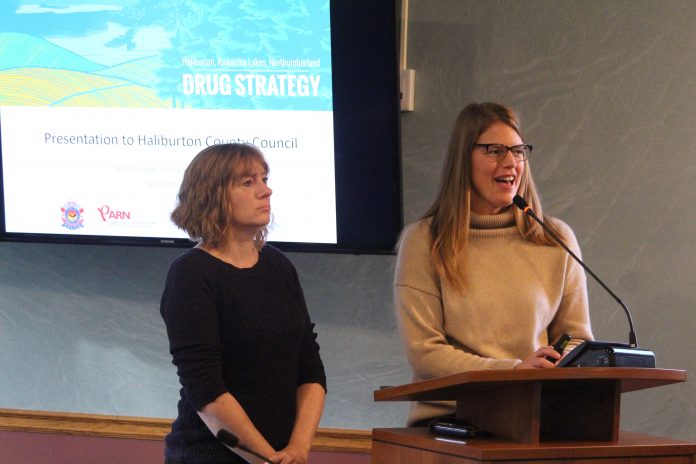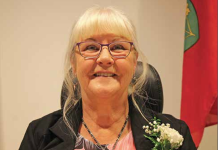
The County of Haliburton is pushing the province to fund a tri-county drug strategy that is about to reach the end of its funding, as opioid issues persist.
Council voted Oct. 23 to send a letter to the minister of health to encourage funding to support the coordination of service providers to address drugs.
The resolution stemmed from a presentation by the Haliburton, Kawartha Lakes, Northumberland Drug Strategy. After three years of efforts to address opioids and co-ordinate services, the strategy’s funding is coming to an end at the end of the year.
Coun. Carol Moffatt expressed concern about the strategy’s work going to waste.
“You get this little bump up of money, do good work and then it just sits there and fizzles away because you can’t go to the next step,” she said. “It’s becoming increasingly frustrating that good work often gets left on the table.”
The drug strategy was initially started by a three-year grant from the Ontario Trillium Foundation. The strategy has worked with more than 50 organizations across the three counties coordinating efforts to address drugs.
“We’ve really played an effective role in bringing diverse groups together,” drug strategy co-ordinator Megan Deman said.
But drugs such as opioids remain a growing problem. Haliburton Kawartha Pine Ridge (HKPR) District Health Unit substances and harm reduction co-ordinator Cathy MacDonald told council opioid-related medical incidents continue to rise.
In 2018, there were 145 confirmed opioid-related emergency department visits across the health unit’s area, MacDonald said. There were also 20 opioid-related deaths from January to September 2018, greater than the eight deaths in the same period in 2017.
“We’re not necessarily capturing how big the problem is,” Deman said “But not to paint a really bad picture, because we are making great strides as a community in our local response.”
Stats specific to the County of Haliburton were not available. Haliburton Highlands OPP said it had one drug overdose in its jurisdiction in 2017 and two suspected overdoses in 2018. However, overdoses are not always reported to OPP.
OPP also said in 2018, there were 124 occurrences where charged were laid for trafficking an opioid other than heroin and 188 charges laid for possession of an opioid other than heroin.
With the drug strategy nearing its end, Deman said they are working to ensure its work does not get dropped. They are also applying for other grant opportunities to continue, she added.
“Having co-ordination for a drug strategy is, I think, really important.”
Coun. Brent Devolin said the municipality is somewhat
limited in what it can do as it does not have any direct links or oversight to
many of the service providers involved.
“We’re a bit player that came into the game late and most of the other
stakeholders either listen to us in a limited fashion or not at all,” Devolin
said “As much as we like to help, it’s frustrating.”
“If you live in Haliburton County and don’t know there’s a drug problem, you got your head in the sand, Moffatt said.
The council resolution was also to support the Association of Municipalities Ontario (AMO) opioid response document. It was released Sept. 4 and features a series of recommendations for the province to take action against opioids.




